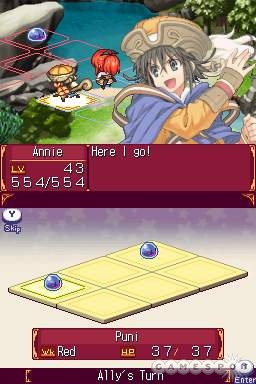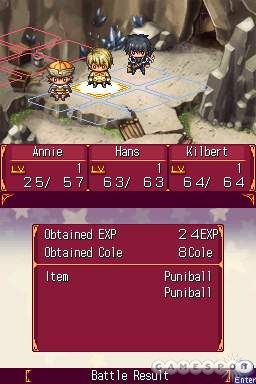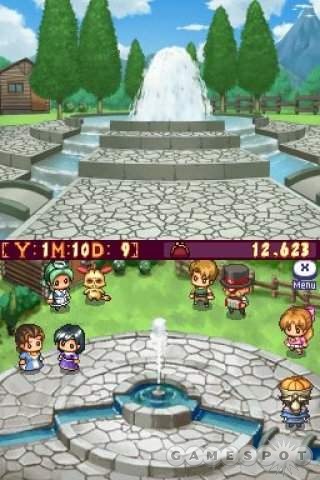Atelier Annie: Alchemists of Sera Island is the latest installment in the long-running Atelier Japanese role-playing games. In a bit of a turnaround for the series, Atelier Annie isn't primarily a JRPG; it's a city-building sim with RPG elements. Yes, you control a character, build a party, and level up, but the main push of the game lies in renovating an entire island with the power of alchemy. Combat leads to resources you use in alchemy; alchemy leads to money; money lets you upgrade the island; and upgrades to the island unlock more monsters to fight for more alchemical ingredients. None of these elements are particularly deep, but there's always something fun to do in Atelier Annie.

Your character in Atelier Annie is Annie Eilenberg, an incredibly lazy young girl. She's so lazy that the opening cinematic has her grandfather sending her to the island's three-year-long alchemy competition to learn some work ethics. It's a silly, lighthearted story, with major elements revolving around Annie's laziness and how people frequently mistake her for a boy. New characters are introduced and treated in the same happy-go-lucky manner. Beaux, for example, is a "world famous adventurer" who literally gets lost crossing the street. You also have a hulking armored swordsman who's a bit of a klutz and an eccentric inventor. Your mentor is a powerful forest spirit, but everyone just makes fun of him for being short. It's all pleasant, silly, and a bit vapid. The whole game revolves around this simple setup: the Kingdom of Orde wants to be more successful, so it has set up prize money and contests to inspire alchemists to turn Sera Island into a beautiful, money-making resort. The island is divided among the town, a few gathering areas, and the attractions you create. You travel from place to place using menus, and as you progress, you unlock new areas that allow you to expand even further.
The town is a traditional RPG hub with places for crafting, healing, shopping, recruiting, and choosing quests. Gathering areas are the various parts of the island where you can get raw materials for your alchemy, with resources that vary from place to place. The icy region will give you very different materials from the crater on the lip of a volcano. Gathering areas are also where you fight monsters. You can corral Annie and two of her wacky allies into being your party members when you go gathering. The game's main storyline is pushed forward by a few specific, timed quests. When you finish those, you receive massive amounts of money with the caveat that it can only be spent on the island's infrastructure--buying and improving attractions. Attractions turn a barren spot of wilderness into something tourists would pay to see: a nature refuge, hotel, museum, or the like. Each attraction is also a quest hub with a "fame" metric that increases as you complete its quests. Once an attraction's fame is high enough, you can upgrade it for more income and more quests.

Combat kicks off from random encounters in gathering areas. Fights play out in turns with some rudimentary tactical choices like putting fighters in the front or back lines. Annie has a wide selection of allies to bring with her, and each one brings a normal attack, as well as a few special abilities. Combat isn't particularly difficult--characters level up quickly and heal whenever they return to town. In a pinch, running away is usually successful. Enemies do have weaknesses to one of the 12 attributes that items may possess--such as "red," "purple," or "aroma"--but you don't need to keep track of them. If you hit the magical enemies with your physical attackers and the physical enemies with your magical attackers, you're good to go.
Alchemy is a meatier system than the combat and a spreadsheet lover's dream. Almost anything that exists in-game can be made from core ingredients that you collect from the gathering areas (most quests involve characters asking you to make or gather something in particular for them). Recipes all call for one or more ingredients and are processed by your alchemical skill with one of your nearly half-dozen alchemical tools. You can also add a supplement to the process to grant your creation a specific attribute. The tool you use and your alchemy skill gain experience as you create. Naturally, some recipes are too difficult until you've got some experience under your belt. Typically, the story quests require you to make a difficult-to-craft item. You also have to buy most recipes, which can be quite pricey.
There's a lot going on in Atelier Annie, and that's really where the challenge of the game lies. Very few of the game's mechanics are difficult on their own. Quests are usually a matter of creating, buying, or gathering a certain item within a time limit. Alchemy consists of simply getting a list of ingredients together, making sure your skill is high enough to succeed, and then pressing the "do alchemy" button. Raising an attraction's fame is just a matter of performing quests. Resort management is a no-fail system; your worst-case scenario would come in the form of not making as much money as you possibly could. There are no factions to appease, no deadly failures in the alchemy lab, and no enemies that are likely to be lethal. The real enemy is managing the sheer amount of stuff you can accomplish under the pressure of time. Atelier Annie comes with a three-year in-game time limit, and then, you're done.

Almost everything you do subtracts time from your three years on the island. Marching around town is free, but just about everything else costs days. Alchemy takes a day or more, depending on how many items you're making. Gathering areas, attractions, and the town all take a few days to walk to from each other. Earning money to buy the recipes you need to perform a quest takes time. Performing quests for the resorts on the east side of the island means that you're paying a much higher price to do quests on the west side of the island--it's a long walk over. Making too much of something is a waste of time, but having to go back to your workshop to cook up more of something for a quest is also a waste. Even walking around a gathering area chews up time on the clock.
Atelier Annie's challenge doesn't lie in redoing fights a dozen times until you finally manage to survive or squeaking out a victory against another alchemist. It lies in optimization and squeezing every drop you can out of the resources you have. While none of the gameplay elements of combat, alchemy, or city management are strong enough to carry a game on their own, they combine into a satisfying gameplay of maximization. And if you're not worried about getting the absolute most out of every day on the in-game calendar, Atelier Annie is a relaxing city sim with goofy Japanese humor and cute art.